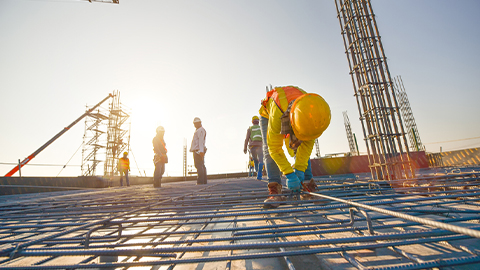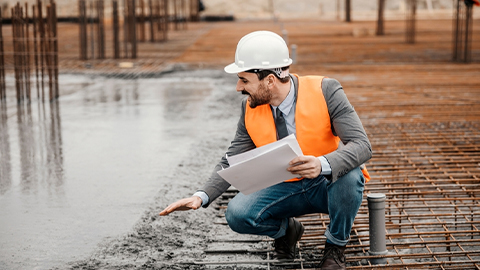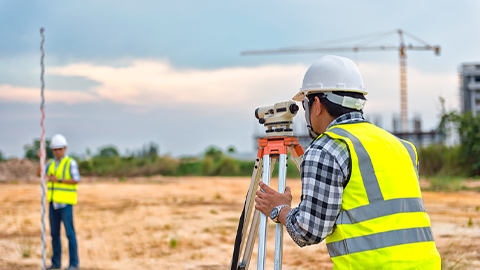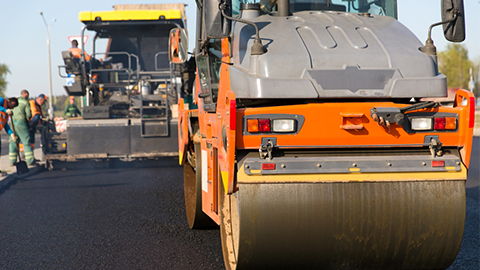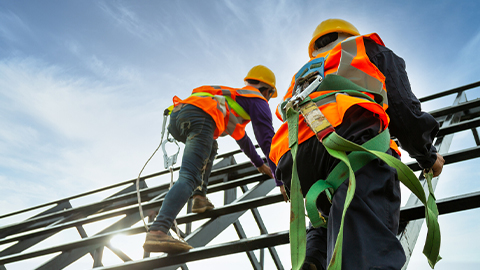

Civil Engineering
Civil Engineering relates to Teaching & Academics, Engineering
Courses to get you started
Learn about the strength, durability, and applications of concrete, asphalt, steel, and timber.<br/> By meeting industry requirements, learn quality control and testing to prevent building material flaws and failures.<br/> Learn how to choose materials for building projects based on cost, environmental impact, and performance.
Learn about the strength, durability, and applications of concrete, asphalt, steel, and timber.<br/> By meeting industry requirements, learn quality control and testing to prevent building material flaws and failures.<br/> Learn how to choose materials for building projects based on cost, environmental impact, and performance.
- 8 Lessons
- 20 Students
Examine the materials, nanofabrication methods, and nanoelectronics applications of the nanoscale.<br/> Learn about quantum dots and how they are used in nanoelectronic devices like screens and solar cells.<br/> Learn about nanoscale electronics, such as quantum point contacts, nanowires, and nanotransistors.
Examine the materials, nanofabrication methods, and nanoelectronics applications of the nanoscale.<br/> Learn about quantum dots and how they are used in nanoelectronic devices like screens and solar cells.<br/> Learn about nanoscale electronics, such as quantum point contacts, nanowires, and nanotransistors.
- 12 Lessons
- 20 Students
Examine efficient advertising, branding, and digital marketing tactics tailored to the automotive sector.<br/> Develop negotiating and client relationship management abilities to sell cars, automotive goods, and services.<br/> Recognizing market trends and business possibilities in the automotive industry requires knowledge of market analysis and customer behavior.
Examine efficient advertising, branding, and digital marketing tactics tailored to the automotive sector.<br/> Develop negotiating and client relationship management abilities to sell cars, automotive goods, and services.<br/> Recognizing market trends and business possibilities in the automotive industry requires knowledge of market analysis and customer behavior.
- 8 Lessons
- 20 Students
Learn about the automotive industry's ethical issues, such as fairness, transparency, and corporate social responsibility (CSR).<br/> Research environmentally and socially responsible business strategies and procedures in the automobile sector.<br/> Recognize the legal standards for responsible corporate behavior, sustainability, and ethics in the automobile industry.
Learn about the automotive industry's ethical issues, such as fairness, transparency, and corporate social responsibility (CSR).<br/> Research environmentally and socially responsible business strategies and procedures in the automobile sector.<br/> Recognize the legal standards for responsible corporate behavior, sustainability, and ethics in the automobile industry.
- 6 Lessons
- 20 Students
Become knowledgeable about designing and constructing several foundation types, such as pile, shallow, and deep foundations.<br/> Be aware of soil parameters, bearing capacity studies, settlement calculations, and soil treatment strategies for stable foundations.<br/> Discover how to evaluate soil characteristics and foundation performance through field and laboratory testing.
Become knowledgeable about designing and constructing several foundation types, such as pile, shallow, and deep foundations.<br/> Be aware of soil parameters, bearing capacity studies, settlement calculations, and soil treatment strategies for stable foundations.<br/> Discover how to evaluate soil characteristics and foundation performance through field and laboratory testing.
- 10 Lessons
- 20 Students
Examine surveying tools and methods for topographic mapping, boundary identification, and land measurement.<br/> Recognize the gathering, handling, and analysis of geographic data using Geographic Information Systems (GIS) for diverse purposes.<br/> Learn the fundamentals of GPS technology for accurate location, navigation, and data collection in civil engineering projects.
Examine surveying tools and methods for topographic mapping, boundary identification, and land measurement.<br/> Recognize the gathering, handling, and analysis of geographic data using Geographic Information Systems (GIS) for diverse purposes.<br/> Learn the fundamentals of GPS technology for accurate location, navigation, and data collection in civil engineering projects.
- 8 Lessons
- 20 Students
Keep abreast of the most recent developments in the automotive sector, such as EVs, autonomous driving, and connected vehicles.<br/> Investigate the sustainable methods and innovations influencing how the automotive sector responds to environmental issues.<br/> Recognize the trade, geopolitical, and supply chain developments that are affecting the automotive industry on the worldwide market.
Keep abreast of the most recent developments in the automotive sector, such as EVs, autonomous driving, and connected vehicles.<br/> Investigate the sustainable methods and innovations influencing how the automotive sector responds to environmental issues.<br/> Recognize the trade, geopolitical, and supply chain developments that are affecting the automotive industry on the worldwide market.
- 6 Lessons
- 20 Students
Program microcontrollers for robots and Internet of Things devices, and integrate them into electronic systems.<br/> Discover the RTOS fundamentals and hone your real-time system design and implementation skills.<br/> Learn how to create smart, linked devices by integrating embedded systems with the Internet of Things (IoT).
Program microcontrollers for robots and Internet of Things devices, and integrate them into electronic systems.<br/> Discover the RTOS fundamentals and hone your real-time system design and implementation skills.<br/> Learn how to create smart, linked devices by integrating embedded systems with the Internet of Things (IoT).
- 14 Lessons
- 20 Students
For effective budgeting, break down construction project costs into labor, materials, equipment, overhead, and contingency.<br/> To create accurate project budgets, master various cost-estimating techniques such as quantity takeoff, unit cost, and parametric estimation.<br/> Research strategies for bid analysis to assess contractor proposals, assuring cost-effectiveness and conformance to project requirements.
For effective budgeting, break down construction project costs into labor, materials, equipment, overhead, and contingency.<br/> To create accurate project budgets, master various cost-estimating techniques such as quantity takeoff, unit cost, and parametric estimation.<br/> Research strategies for bid analysis to assess contractor proposals, assuring cost-effectiveness and conformance to project requirements.
- 8 Lessons
- 20 Students
Learn how inverters, rectifiers, and converters are utilized in power systems and how they are power electronic components.<br/> Learn about electric motors, motor drives, motor control methods, and applications..<br/> Research the use of power electronics in renewable energy systems, such as wind and solar energy production.
Learn how inverters, rectifiers, and converters are utilized in power systems and how they are power electronic components.<br/> Learn about electric motors, motor drives, motor control methods, and applications..<br/> Research the use of power electronics in renewable energy systems, such as wind and solar energy production.
- 12 Lessons
- 20 Students
Lay the groundwork for understanding quantum electronic devices by delving into the fundamentals of quantum physics and quantum states.<br/> Understand the principles underlying quantum algorithms, quantum gates, and quantum computers.<br/> Discover the use of quantum optics in quantum communication and information processing.
Lay the groundwork for understanding quantum electronic devices by delving into the fundamentals of quantum physics and quantum states.<br/> Understand the principles underlying quantum algorithms, quantum gates, and quantum computers.<br/> Discover the use of quantum optics in quantum communication and information processing.
- 12 Lessons
- 20 Students
Learn how to disassemble an engine step-by-step, check parts for wear and damage, and pinpoint places that need to be rebuilt.<br/> Develop precision machining skills for engine components such as cylinder heads, blocks, and crankshafts.<br/> Examine techniques for modifying engines to improve their performance, such as increasing horsepower, fuel efficiency, and optimizing torque.
Learn how to disassemble an engine step-by-step, check parts for wear and damage, and pinpoint places that need to be rebuilt.<br/> Develop precision machining skills for engine components such as cylinder heads, blocks, and crankshafts.<br/> Examine techniques for modifying engines to improve their performance, such as increasing horsepower, fuel efficiency, and optimizing torque.
- 12 Lessons
- 20 Students
Recognize cutting-edge methods for tuning engines, such as modifying fuel injection, ignition timing, and airflow.<br/> Consider forced induction techniques like turbocharging and supercharging to improve engine performance and economy.<br/> Learn about exhaust systems, intake systems, and suspension adjustments that can enhance the performance of your car.
Recognize cutting-edge methods for tuning engines, such as modifying fuel injection, ignition timing, and airflow.<br/> Consider forced induction techniques like turbocharging and supercharging to improve engine performance and economy.<br/> Learn about exhaust systems, intake systems, and suspension adjustments that can enhance the performance of your car.
- 10 Lessons
- 20 Students
Recognize the processes used to inspect the quality of automotive systems and parts to ensure they adhere to performance and safety requirements.<br/> Learn how to use statistical techniques to evaluate and enhance the efficiency of the production and repair of automobiles.<br/> Learn how to reduce defects and enhance overall product quality by identifying and resolving the causes of quality problems.
Recognize the processes used to inspect the quality of automotive systems and parts to ensure they adhere to performance and safety requirements.<br/> Learn how to use statistical techniques to evaluate and enhance the efficiency of the production and repair of automobiles.<br/> Learn how to reduce defects and enhance overall product quality by identifying and resolving the causes of quality problems.
- 10 Lessons
- 20 Students
Learn about the fundamentals of geometric design for roads and highways, including alignment, cross-section, and sight distance.<br/> To estimate road capacity traffic flow patterns and to build roads that maximize traffic safety and efficiency, learn how to conduct traffic analysis..<br/> Calculate pavement thickness, select materials, and consider maintenance considerations for long-lasting, secure road surfaces.
Learn about the fundamentals of geometric design for roads and highways, including alignment, cross-section, and sight distance.<br/> To estimate road capacity traffic flow patterns and to build roads that maximize traffic safety and efficiency, learn how to conduct traffic analysis..<br/> Calculate pavement thickness, select materials, and consider maintenance considerations for long-lasting, secure road surfaces.
- 10 Lessons
- 20 Students
Beach replenishment and coastal protection require an understanding of wave dynamics and coastal erosion.<br/> Study ways for preventing coastal erosion, such as seawalls, breakwaters, and beach restoration techniques.<br/> Learn how to create robust coastal structures that can resist the effects of changing weather patterns and increasing sea levels.
Beach replenishment and coastal protection require an understanding of wave dynamics and coastal erosion.<br/> Study ways for preventing coastal erosion, such as seawalls, breakwaters, and beach restoration techniques.<br/> Learn how to create robust coastal structures that can resist the effects of changing weather patterns and increasing sea levels.
- 10 Lessons
- 20 Students
Comprehend land use zoning, rules, and urban planning principles to design sustainable and useful urban environments.<br/> Learn how to create detailed master plans for cities and regions considering infrastructure, housing, transportation, and green areas.<br/> Discover the principles of sustainable urban planning, including walkability, public transportation, and mixed-use development.
Comprehend land use zoning, rules, and urban planning principles to design sustainable and useful urban environments.<br/> Learn how to create detailed master plans for cities and regions considering infrastructure, housing, transportation, and green areas.<br/> Discover the principles of sustainable urban planning, including walkability, public transportation, and mixed-use development.
- 10 Lessons
- 20 Students
Mastering the design, alignment, and grading of railway tracks ensures the security and effectiveness of rail transportation systems.<br/> Recognize the need to design and maintain stations, tunnels, and other railway infrastructure elements..<br/> Examine the scheduling, managerial, and safety aspects of railroad operations.
Mastering the design, alignment, and grading of railway tracks ensures the security and effectiveness of rail transportation systems.<br/> Recognize the need to design and maintain stations, tunnels, and other railway infrastructure elements..<br/> Examine the scheduling, managerial, and safety aspects of railroad operations.
- 10 Lessons
- 20 Students
Recognize the advanced driver assistance systems (ADAS) and engine control units (ECUs) utilized in contemporary vehicles.<br/> Discover the Controller Area Network (CAN) bus's function in controlling and communicating with vehicles.</br> Learn about electronic components in hybrid and electric cars, such as battery management and regenerative braking.
Recognize the advanced driver assistance systems (ADAS) and engine control units (ECUs) utilized in contemporary vehicles.<br/> Discover the Controller Area Network (CAN) bus's function in controlling and communicating with vehicles.</br> Learn about electronic components in hybrid and electric cars, such as battery management and regenerative braking.
- 12 Lessons
- 20 Students
Learn the specifications, simulations, layout, and fabrication steps of the integrated circuit (IC) design process.<br/> Master the design of operational amplifiers (op-amps), among other analog amplifiers, to achieve desired performance criteria.<br/> Learn to create precise voltage references necessary for accurate and reliable analog circuits.
Learn the specifications, simulations, layout, and fabrication steps of the integrated circuit (IC) design process.<br/> Master the design of operational amplifiers (op-amps), among other analog amplifiers, to achieve desired performance criteria.<br/> Learn to create precise voltage references necessary for accurate and reliable analog circuits.
- 12 Lessons
- 20 Students
Examine cutting-edge control techniques for robotic systems, such as adaptive control, neural networks, and fuzzy logic.<br/> Discover how image processing, computer vision, and robotic vision systems are used.<br/> Examine the practical uses of cutting-edge robotics in manufacturing, medicine, and autonomous cars.
Examine cutting-edge control techniques for robotic systems, such as adaptive control, neural networks, and fuzzy logic.<br/> Discover how image processing, computer vision, and robotic vision systems are used.<br/> Examine the practical uses of cutting-edge robotics in manufacturing, medicine, and autonomous cars.
- 14 Lessons
- 20 Students
Learn about the characteristics of semiconductors, conductors, insulators, and other electronic materials.<br/> Explore band theory, semiconductor device behavior, and semiconductor physics.<br/> Learn about methods for spectroscopy and microscopy to characterize electronic materials.
Learn about the characteristics of semiconductors, conductors, insulators, and other electronic materials.<br/> Explore band theory, semiconductor device behavior, and semiconductor physics.<br/> Learn about methods for spectroscopy and microscopy to characterize electronic materials.
- 12 Lessons
- 20 Students
Develop your skills in building electronic medical devices such as patient monitoring and diagnostic tools.<br/> Find out how to use biosensors to identify biological signals and analytes for medical purposes.<br/> Research the electronic components used in X-ray, MRI, and ultrasound systems for medical imaging.
Develop your skills in building electronic medical devices such as patient monitoring and diagnostic tools.<br/> Find out how to use biosensors to identify biological signals and analytes for medical purposes.<br/> Research the electronic components used in X-ray, MRI, and ultrasound systems for medical imaging.
- 14 Lessons
- 20 Students
For interactions with car owners, handling issues, and assuring satisfaction with automotive services, develop great customer service skills.<br/> Learn about managing an automotive service center, including scheduling, inventory control, and finances.<br/> Discover how to implement quality control procedures to guarantee that automotive services satisfy industry norms and client expectations.
For interactions with car owners, handling issues, and assuring satisfaction with automotive services, develop great customer service skills.<br/> Learn about managing an automotive service center, including scheduling, inventory control, and finances.<br/> Discover how to implement quality control procedures to guarantee that automotive services satisfy industry norms and client expectations.
- 12 Lessons
- 20 Students
Learn about the norms and restrictions for emissions set by the government and how automobile technology helps to reduce hazardous emissions.<br/> Learn about the techniques and tools used for measuring and regulating vehicle emissions.<br/> Research clean technology solutions like catalytic converters and exhaust gas recirculation (EGR) to lower vehicle emissions.
Learn about the norms and restrictions for emissions set by the government and how automobile technology helps to reduce hazardous emissions.<br/> Learn about the techniques and tools used for measuring and regulating vehicle emissions.<br/> Research clean technology solutions like catalytic converters and exhaust gas recirculation (EGR) to lower vehicle emissions.
- 8 Lessons
- 20 Students
Know the safety features of contemporary cars, such as airbags, anti-lock braking systems, and electronic stability control (ESC).<br/> Examine crash testing procedures and crash data analysis to enhance vehicle safety features.<br/> Find more about the standards and laws that control car safety, such as occupant protection requirements and crash test results.
Know the safety features of contemporary cars, such as airbags, anti-lock braking systems, and electronic stability control (ESC).<br/> Examine crash testing procedures and crash data analysis to enhance vehicle safety features.<br/> Find more about the standards and laws that control car safety, such as occupant protection requirements and crash test results.
- 10 Lessons
- 20 Students
Relevant Courses
Program microcontrollers for robots and Internet of Things devices, and integrate them into electronic systems.<br/> Discover the RTOS fundamentals and hone your real-time system design and implementation skills.<br/> Learn how to create smart, linked devices by integrating embedded systems with the Internet of Things (IoT).
Program microcontrollers for robots and Internet of Things devices, and integrate them into electronic systems.<br/> Discover the RTOS fundamentals and hone your real-time system design and implementation skills.<br/> Learn how to create smart, linked devices by integrating embedded systems with the Internet of Things (IoT).
- 14 Lessons
- 20 Students
Learn about the strength, durability, and applications of concrete, asphalt, steel, and timber.<br/> By meeting industry requirements, learn quality control and testing to prevent building material flaws and failures.<br/> Learn how to choose materials for building projects based on cost, environmental impact, and performance.
Learn about the strength, durability, and applications of concrete, asphalt, steel, and timber.<br/> By meeting industry requirements, learn quality control and testing to prevent building material flaws and failures.<br/> Learn how to choose materials for building projects based on cost, environmental impact, and performance.
- 8 Lessons
- 20 Students
For effective budgeting, break down construction project costs into labor, materials, equipment, overhead, and contingency.<br/> To create accurate project budgets, master various cost-estimating techniques such as quantity takeoff, unit cost, and parametric estimation.<br/> Research strategies for bid analysis to assess contractor proposals, assuring cost-effectiveness and conformance to project requirements.
For effective budgeting, break down construction project costs into labor, materials, equipment, overhead, and contingency.<br/> To create accurate project budgets, master various cost-estimating techniques such as quantity takeoff, unit cost, and parametric estimation.<br/> Research strategies for bid analysis to assess contractor proposals, assuring cost-effectiveness and conformance to project requirements.
- 8 Lessons
- 20 Students
Comprehend land use zoning, rules, and urban planning principles to design sustainable and useful urban environments.<br/> Learn how to create detailed master plans for cities and regions considering infrastructure, housing, transportation, and green areas.<br/> Discover the principles of sustainable urban planning, including walkability, public transportation, and mixed-use development.
Comprehend land use zoning, rules, and urban planning principles to design sustainable and useful urban environments.<br/> Learn how to create detailed master plans for cities and regions considering infrastructure, housing, transportation, and green areas.<br/> Discover the principles of sustainable urban planning, including walkability, public transportation, and mixed-use development.
- 10 Lessons
- 20 Students
Mastering the design, alignment, and grading of railway tracks ensures the security and effectiveness of rail transportation systems.<br/> Recognize the need to design and maintain stations, tunnels, and other railway infrastructure elements..<br/> Examine the scheduling, managerial, and safety aspects of railroad operations.
Mastering the design, alignment, and grading of railway tracks ensures the security and effectiveness of rail transportation systems.<br/> Recognize the need to design and maintain stations, tunnels, and other railway infrastructure elements..<br/> Examine the scheduling, managerial, and safety aspects of railroad operations.
- 10 Lessons
- 20 Students
Construction safety protocols, rules, and best practices can help prevent accidents and guarantee worker safety.<br/> Recognize risk assessment procedures used in construction projects, such as hazard identification, risk analysis, and risk mitigation techniques.<br/> Create safety management strategies and emergency response plans to address potential risks and guarantee adherence to safety regulations.
Construction safety protocols, rules, and best practices can help prevent accidents and guarantee worker safety.<br/> Recognize risk assessment procedures used in construction projects, such as hazard identification, risk analysis, and risk mitigation techniques.<br/> Create safety management strategies and emergency response plans to address potential risks and guarantee adherence to safety regulations.
- 8 Lessons
- 20 Students
Learn how inverters, rectifiers, and converters are utilized in power systems and how they are power electronic components.<br/> Learn about electric motors, motor drives, motor control methods, and applications..<br/> Research the use of power electronics in renewable energy systems, such as wind and solar energy production.
Learn how inverters, rectifiers, and converters are utilized in power systems and how they are power electronic components.<br/> Learn about electric motors, motor drives, motor control methods, and applications..<br/> Research the use of power electronics in renewable energy systems, such as wind and solar energy production.
- 12 Lessons
- 20 Students
Lay the groundwork for understanding quantum electronic devices by delving into the fundamentals of quantum physics and quantum states.<br/> Understand the principles underlying quantum algorithms, quantum gates, and quantum computers.<br/> Discover the use of quantum optics in quantum communication and information processing.
Lay the groundwork for understanding quantum electronic devices by delving into the fundamentals of quantum physics and quantum states.<br/> Understand the principles underlying quantum algorithms, quantum gates, and quantum computers.<br/> Discover the use of quantum optics in quantum communication and information processing.
- 12 Lessons
- 20 Students
Examine the materials, nanofabrication methods, and nanoelectronics applications of the nanoscale.<br/> Learn about quantum dots and how they are used in nanoelectronic devices like screens and solar cells.<br/> Learn about nanoscale electronics, such as quantum point contacts, nanowires, and nanotransistors.
Examine the materials, nanofabrication methods, and nanoelectronics applications of the nanoscale.<br/> Learn about quantum dots and how they are used in nanoelectronic devices like screens and solar cells.<br/> Learn about nanoscale electronics, such as quantum point contacts, nanowires, and nanotransistors.
- 12 Lessons
- 20 Students
Recognize the advanced driver assistance systems (ADAS) and engine control units (ECUs) utilized in contemporary vehicles.<br/> Discover the Controller Area Network (CAN) bus's function in controlling and communicating with vehicles.</br> Learn about electronic components in hybrid and electric cars, such as battery management and regenerative braking.
Recognize the advanced driver assistance systems (ADAS) and engine control units (ECUs) utilized in contemporary vehicles.<br/> Discover the Controller Area Network (CAN) bus's function in controlling and communicating with vehicles.</br> Learn about electronic components in hybrid and electric cars, such as battery management and regenerative braking.
- 12 Lessons
- 20 Students
Learn how to disassemble an engine step-by-step, check parts for wear and damage, and pinpoint places that need to be rebuilt.<br/> Develop precision machining skills for engine components such as cylinder heads, blocks, and crankshafts.<br/> Examine techniques for modifying engines to improve their performance, such as increasing horsepower, fuel efficiency, and optimizing torque.
Learn how to disassemble an engine step-by-step, check parts for wear and damage, and pinpoint places that need to be rebuilt.<br/> Develop precision machining skills for engine components such as cylinder heads, blocks, and crankshafts.<br/> Examine techniques for modifying engines to improve their performance, such as increasing horsepower, fuel efficiency, and optimizing torque.
- 12 Lessons
- 20 Students
Recognize cutting-edge methods for tuning engines, such as modifying fuel injection, ignition timing, and airflow.<br/> Consider forced induction techniques like turbocharging and supercharging to improve engine performance and economy.<br/> Learn about exhaust systems, intake systems, and suspension adjustments that can enhance the performance of your car.
Recognize cutting-edge methods for tuning engines, such as modifying fuel injection, ignition timing, and airflow.<br/> Consider forced induction techniques like turbocharging and supercharging to improve engine performance and economy.<br/> Learn about exhaust systems, intake systems, and suspension adjustments that can enhance the performance of your car.
- 10 Lessons
- 20 Students
Recognize the processes used to inspect the quality of automotive systems and parts to ensure they adhere to performance and safety requirements.<br/> Learn how to use statistical techniques to evaluate and enhance the efficiency of the production and repair of automobiles.<br/> Learn how to reduce defects and enhance overall product quality by identifying and resolving the causes of quality problems.
Recognize the processes used to inspect the quality of automotive systems and parts to ensure they adhere to performance and safety requirements.<br/> Learn how to use statistical techniques to evaluate and enhance the efficiency of the production and repair of automobiles.<br/> Learn how to reduce defects and enhance overall product quality by identifying and resolving the causes of quality problems.
- 10 Lessons
- 20 Students
Examine efficient advertising, branding, and digital marketing tactics tailored to the automotive sector.<br/> Develop negotiating and client relationship management abilities to sell cars, automotive goods, and services.<br/> Recognizing market trends and business possibilities in the automotive industry requires knowledge of market analysis and customer behavior.
Examine efficient advertising, branding, and digital marketing tactics tailored to the automotive sector.<br/> Develop negotiating and client relationship management abilities to sell cars, automotive goods, and services.<br/> Recognizing market trends and business possibilities in the automotive industry requires knowledge of market analysis and customer behavior.
- 8 Lessons
- 20 Students
Learn about the automotive industry's ethical issues, such as fairness, transparency, and corporate social responsibility (CSR).<br/> Research environmentally and socially responsible business strategies and procedures in the automobile sector.<br/> Recognize the legal standards for responsible corporate behavior, sustainability, and ethics in the automobile industry.
Learn about the automotive industry's ethical issues, such as fairness, transparency, and corporate social responsibility (CSR).<br/> Research environmentally and socially responsible business strategies and procedures in the automobile sector.<br/> Recognize the legal standards for responsible corporate behavior, sustainability, and ethics in the automobile industry.
- 6 Lessons
- 20 Students
Learn about the fundamentals of geometric design for roads and highways, including alignment, cross-section, and sight distance.<br/> To estimate road capacity traffic flow patterns and to build roads that maximize traffic safety and efficiency, learn how to conduct traffic analysis..<br/> Calculate pavement thickness, select materials, and consider maintenance considerations for long-lasting, secure road surfaces.
Learn about the fundamentals of geometric design for roads and highways, including alignment, cross-section, and sight distance.<br/> To estimate road capacity traffic flow patterns and to build roads that maximize traffic safety and efficiency, learn how to conduct traffic analysis..<br/> Calculate pavement thickness, select materials, and consider maintenance considerations for long-lasting, secure road surfaces.
- 10 Lessons
- 20 Students
Beach replenishment and coastal protection require an understanding of wave dynamics and coastal erosion.<br/> Study ways for preventing coastal erosion, such as seawalls, breakwaters, and beach restoration techniques.<br/> Learn how to create robust coastal structures that can resist the effects of changing weather patterns and increasing sea levels.
Beach replenishment and coastal protection require an understanding of wave dynamics and coastal erosion.<br/> Study ways for preventing coastal erosion, such as seawalls, breakwaters, and beach restoration techniques.<br/> Learn how to create robust coastal structures that can resist the effects of changing weather patterns and increasing sea levels.
- 10 Lessons
- 20 Students
Become knowledgeable about designing and constructing several foundation types, such as pile, shallow, and deep foundations.<br/> Be aware of soil parameters, bearing capacity studies, settlement calculations, and soil treatment strategies for stable foundations.<br/> Discover how to evaluate soil characteristics and foundation performance through field and laboratory testing.
Become knowledgeable about designing and constructing several foundation types, such as pile, shallow, and deep foundations.<br/> Be aware of soil parameters, bearing capacity studies, settlement calculations, and soil treatment strategies for stable foundations.<br/> Discover how to evaluate soil characteristics and foundation performance through field and laboratory testing.
- 10 Lessons
- 20 Students
Examine surveying tools and methods for topographic mapping, boundary identification, and land measurement.<br/> Recognize the gathering, handling, and analysis of geographic data using Geographic Information Systems (GIS) for diverse purposes.<br/> Learn the fundamentals of GPS technology for accurate location, navigation, and data collection in civil engineering projects.
Examine surveying tools and methods for topographic mapping, boundary identification, and land measurement.<br/> Recognize the gathering, handling, and analysis of geographic data using Geographic Information Systems (GIS) for diverse purposes.<br/> Learn the fundamentals of GPS technology for accurate location, navigation, and data collection in civil engineering projects.
- 8 Lessons
- 20 Students
Learn the specifications, simulations, layout, and fabrication steps of the integrated circuit (IC) design process.<br/> Master the design of operational amplifiers (op-amps), among other analog amplifiers, to achieve desired performance criteria.<br/> Learn to create precise voltage references necessary for accurate and reliable analog circuits.
Learn the specifications, simulations, layout, and fabrication steps of the integrated circuit (IC) design process.<br/> Master the design of operational amplifiers (op-amps), among other analog amplifiers, to achieve desired performance criteria.<br/> Learn to create precise voltage references necessary for accurate and reliable analog circuits.
- 12 Lessons
- 20 Students
Examine cutting-edge control techniques for robotic systems, such as adaptive control, neural networks, and fuzzy logic.<br/> Discover how image processing, computer vision, and robotic vision systems are used.<br/> Examine the practical uses of cutting-edge robotics in manufacturing, medicine, and autonomous cars.
Examine cutting-edge control techniques for robotic systems, such as adaptive control, neural networks, and fuzzy logic.<br/> Discover how image processing, computer vision, and robotic vision systems are used.<br/> Examine the practical uses of cutting-edge robotics in manufacturing, medicine, and autonomous cars.
- 14 Lessons
- 20 Students
Learn about the characteristics of semiconductors, conductors, insulators, and other electronic materials.<br/> Explore band theory, semiconductor device behavior, and semiconductor physics.<br/> Learn about methods for spectroscopy and microscopy to characterize electronic materials.
Learn about the characteristics of semiconductors, conductors, insulators, and other electronic materials.<br/> Explore band theory, semiconductor device behavior, and semiconductor physics.<br/> Learn about methods for spectroscopy and microscopy to characterize electronic materials.
- 12 Lessons
- 20 Students
Develop your skills in building electronic medical devices such as patient monitoring and diagnostic tools.<br/> Find out how to use biosensors to identify biological signals and analytes for medical purposes.<br/> Research the electronic components used in X-ray, MRI, and ultrasound systems for medical imaging.
Develop your skills in building electronic medical devices such as patient monitoring and diagnostic tools.<br/> Find out how to use biosensors to identify biological signals and analytes for medical purposes.<br/> Research the electronic components used in X-ray, MRI, and ultrasound systems for medical imaging.
- 14 Lessons
- 20 Students
For interactions with car owners, handling issues, and assuring satisfaction with automotive services, develop great customer service skills.<br/> Learn about managing an automotive service center, including scheduling, inventory control, and finances.<br/> Discover how to implement quality control procedures to guarantee that automotive services satisfy industry norms and client expectations.
For interactions with car owners, handling issues, and assuring satisfaction with automotive services, develop great customer service skills.<br/> Learn about managing an automotive service center, including scheduling, inventory control, and finances.<br/> Discover how to implement quality control procedures to guarantee that automotive services satisfy industry norms and client expectations.
- 12 Lessons
- 20 Students
Learn about the norms and restrictions for emissions set by the government and how automobile technology helps to reduce hazardous emissions.<br/> Learn about the techniques and tools used for measuring and regulating vehicle emissions.<br/> Research clean technology solutions like catalytic converters and exhaust gas recirculation (EGR) to lower vehicle emissions.
Learn about the norms and restrictions for emissions set by the government and how automobile technology helps to reduce hazardous emissions.<br/> Learn about the techniques and tools used for measuring and regulating vehicle emissions.<br/> Research clean technology solutions like catalytic converters and exhaust gas recirculation (EGR) to lower vehicle emissions.
- 8 Lessons
- 20 Students
Know the safety features of contemporary cars, such as airbags, anti-lock braking systems, and electronic stability control (ESC).<br/> Examine crash testing procedures and crash data analysis to enhance vehicle safety features.<br/> Find more about the standards and laws that control car safety, such as occupant protection requirements and crash test results.
Know the safety features of contemporary cars, such as airbags, anti-lock braking systems, and electronic stability control (ESC).<br/> Examine crash testing procedures and crash data analysis to enhance vehicle safety features.<br/> Find more about the standards and laws that control car safety, such as occupant protection requirements and crash test results.
- 10 Lessons
- 20 Students
Keep abreast of the most recent developments in the automotive sector, such as EVs, autonomous driving, and connected vehicles.<br/> Investigate the sustainable methods and innovations influencing how the automotive sector responds to environmental issues.<br/> Recognize the trade, geopolitical, and supply chain developments that are affecting the automotive industry on the worldwide market.
Keep abreast of the most recent developments in the automotive sector, such as EVs, autonomous driving, and connected vehicles.<br/> Investigate the sustainable methods and innovations influencing how the automotive sector responds to environmental issues.<br/> Recognize the trade, geopolitical, and supply chain developments that are affecting the automotive industry on the worldwide market.
- 6 Lessons
- 20 Students

